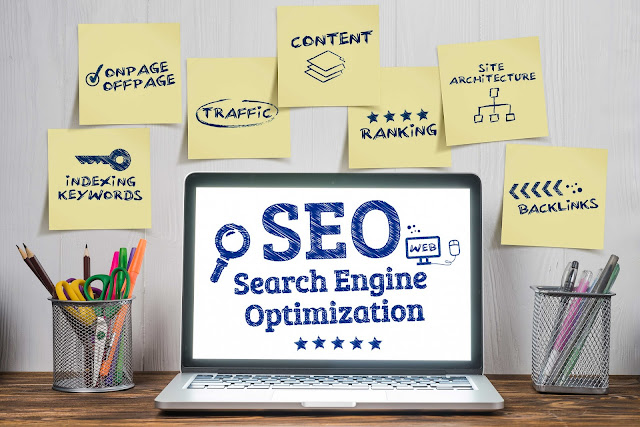The science of optimizing a website to make it more visible when people search for goods or services is known as search engine optimization. The chance that a brand will attract business increases with a website's search engine presence.
Five Ways to Boost the Ranking of Your Website (SEO)
Follow these suggestions to improve your search engine optimization (SEO) and watch your website rise to the top of search engine results.
1- Publish Relevant, Authoritative Content
High-quality, meaningful content is the most important factor for search engine rankings, and there is no substitute for good content - this is especially true for SEO marketing. Quality content created specifically for your target audience will increase traffic to your website, which in turn will improve your website's authority and relevance. Improve your writing skills on the web and present yourself as an expert on the topic you are writing about.
A. Keywords
Identify a specific keyword for each authoritative page on your website. Think about how your readers will respond with search terms like:
- Online Masters in Engineering Manamentge
- What is biomedical engineering?
- Title IX Educational Resources
- Photographing Northern Lights
- How to apply for scholarships?
- When is the deadline for the FAFSA?
- How do engineering and engineering technology vary from one another?
B. Several keyword phrases
It is very difficult for a website to rank in search engines for multiple key phrases - unless those phrases are very similar. A single page may rank for both "biomedical engineering jobs" and "biomedical engineering careers." It is unlikely that a single page will rank for "student affairs" and "dean of methods for reporting violence, gender discrimination, or students.
If you want your website to rank for multiple search terms, you will need to create a separate webpage for each search term.
C. Keyword placement
Once you have selected your keyword for a particular page, you should consider the following questions:
- Can I use all or part of the keyword in the page URL (by using keywords in folders)?
- Can I use all or part of the keyword in the page title?
- Can I use all or part of the keyword phrase in the page headings and subheadings?
Your search engine rankings may rise if you respond "yes" to these inquiries. However, be natural and user-friendly. For example, you don't want the word "engineering" to appear three or more times in the URL or the term "northern lights" to be repeated in the page title and every heading. Readability and usability still take precedence over search engine optimization.
D. Content
Besides the URL, title, and headings of the page, the content has the biggest impact on search engine rankings. Repeat your key phrase several times on the page - once or twice in the first and last paragraphs and two to four times in the rest of the content. Be engaging. Strategically link to relevant sources and additional information - both within your company's overall website and to other useful websites.
Don't forget to use bold, italics, headings (especially H1), and other highlighting to emphasize these keywords - but don't overdo it. You should still be able to read your writing and language naturally. Never sacrifice good copy for SEO. The best pages are those that are written for people, not search engines. Read more about SEO marketing so you can find new opportunities for content.
2- Update Your Content Regularly
You've probably noticed that we put a lot of emphasis on content. Search engines do too. Make sure your website's content is up-to-date because it is thought to be one of the finest markers of its relevancy. Check your content on a set schedule (e.g., every six months) and make updates as needed.
Blogging
You may also raise your search engine rankings by adding more keyword-rich material to your department's news blog. Blog posts can also be shorter updates on the specific topics you are targeting. Link your related CMS websites and blog posts together if it helps to give the reader a better picture or additional information about the topic.
3- Metadata
When designing your website, each page contains an area between the <head> tags to insert metadata or information about the content of your page. If you have a CMS site that was originally created by the UMC web team, this data is pre-filled for you. However, it is important that you review and update the metadata as your site changes over time.
A. Title Metadata
The title metadata is responsible for the page titles that appear at the top of a browser window and as a heading in search engine results. On your page, they are the most important metadata.
For those who have a CMS website, the web team has developed an automated system for creating the meta title for each web page based on your page title. This emphasizes the importance of well-thought-out page titles enriched with keywords.
B. Description Metadata
Description metadata is the textual description that a browser can use when searching for your page. Think of it as your website's storefront - a concise and engaging description of the content, with the goal of encouraging visitors to enter the site. Typically, a solid meta description has two complete statements. Search engines may not always use your meta description, but it's important that you give them the opportunity to do so.
C. Keyword Metadata
Keyword metadata is rarely if ever, used to create search engine rankings. It doesn't harm to provide your keyword information, even if you should already be aware of your keyword terms. You should include a variety of phrases. As a general rule, you should limit yourself to 3-7 phrases, with each phrase consisting of 1-4 words. A degree in computer science is a nice example.
4- Have a link-worthy site
A content-rich, authoritative, and unbiased website that helps visitors learn more about what interests them will most likely attract links from other websites, which will improve your search engine optimization.
Improve your authority and credibility by including relevant links in the text. Instead of "click here" links, write out the name of the destination. "Click here" has no value to the search engine beyond the attached URL, While "Michigan Tech Enterprise Program" is keyword rich and will improve both your search engine rankings and the page's ranks to which you are connecting. Always use descriptive links with keywords - this not only improves search engine optimization but also provides value to your readers, including people with disabilities or screen readers.
5- Use Alt Tags
Always provide a description with your image and video files by using alt tags, or alternative text descriptions. They are important, especially for people who use text-only browsers or screen readers, as they enable search engines to find your website.
Is SEO something I can do on my own?" the answer is clear. You don't have to hire an outside agency to improve your SEO, and this guide will give you some basic SEO tips to get you started. With this wealth of resources, you'll be well-positioned to excel in your do-it-yourself SEO efforts and ultimately provide your website visitors with a better user experience.
Always provide a description with your image and video files by using alt tags, or alternative text descriptions. They are important, especially for people who use text-only browsers or screen readers, as they enable search engines to find your website.
Is SEO something I can do on my own?" the answer is clear. You don't have to hire an outside agency to improve your SEO, and this guide will give you some basic SEO tips to get you started. With this wealth of resources, you'll be well-positioned to excel in your do-it-yourself SEO efforts and ultimately provide your website visitors with a better user experience.



0 Comments
Anyone no scam comments